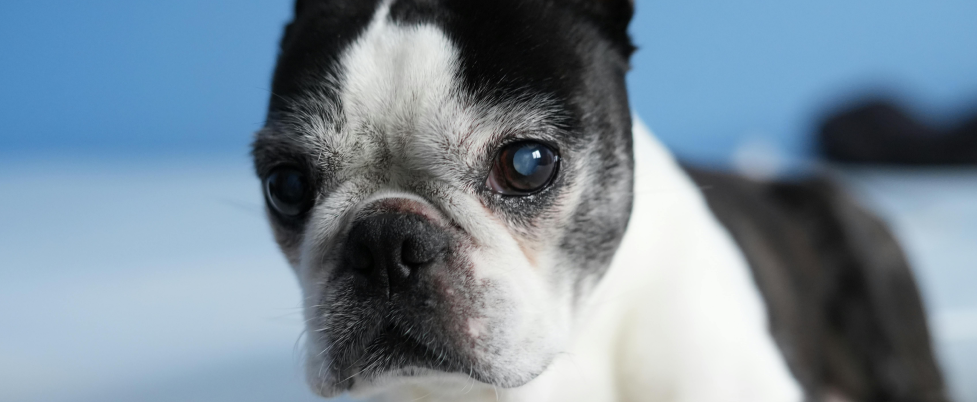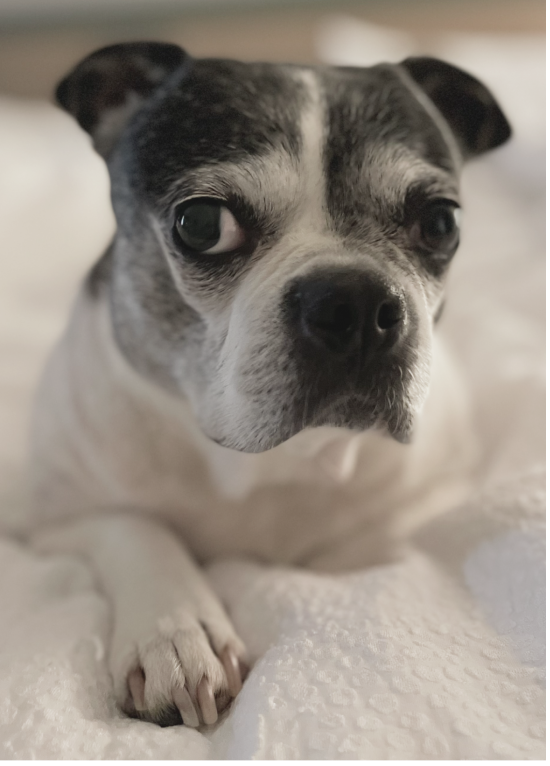LIFE STAGES OF A BOSTON TERRIER / SENIOR LIFE

Disclaimer: I am not a veterinarian. Always consult your vet for advice tailored to your dog’s specific needs.
Caring for Your Aging Boston Terrier
Boston Terriers are affectionate, playful companions, but as they enter their senior years, their needs begin to change. Aging can bring joint stiffness, lower energy levels, and an increased risk of health issues, making it essential to adjust their care routine. With proper attention and proactive care, you can help your Boston Terrier stay comfortable, happy, and active well into their golden years.
Why Senior Care Matters
Senior Boston Terriers require specialized care to maintain their quality of life. Aging can impact their mobility, digestion, and overall well-being, making it important to:
- Support their joints and muscles through proper diet and gentle exercise.
- Monitor their health closely for early signs of common senior ailments.
- Adjust their daily routine to accommodate lower energy levels and potential cognitive changes.
When Is a Boston Terrier Considered Senior?
Boston Terriers typically enter their senior years around 7–8 years old, though factors like genetics, diet, and lifestyle can affect their aging process. Some may show signs of aging earlier, while others remain spry for longer. Being aware of these changes early on helps you provide the best care possible.
Adjusting Your Senior Boston’s Diet
As your Boston Terrier ages, their metabolism slows down, and their nutritional needs change. Adjusting their diet ensures they maintain a healthy weight, strong muscles, and optimal digestion while supporting their aging joints and overall well-being.
Nutritional Needs for Older Dogs
Senior Boston Terriers benefit from a balanced diet tailored to their age and activity level. Look for foods that include:
- Lower calories – Helps prevent weight gain, which can strain aging joints.
- High-quality protein – Maintains muscle mass and strength.
- Omega-3 fatty acids – Supports joint health and keeps their coat shiny.
- Easily digestible ingredients – Helps with sensitive stomachs and digestive changes.
Supplements to Consider
Adding the right supplements can enhance your Boston’s mobility, digestion, and overall health:
- Glucosamine and chondroitin – Supports joint function and reduces stiffness.
- Fish oil – Provides anti-inflammatory benefits and promotes brain health.
- Probiotics – Aids digestion and boosts gut health.
Meal Frequency and Portion Sizes
Always consult your veterinarian before introducing new supplements to ensure they’re appropriate for your dog’s specific needs.
- Smaller, more frequent meals can be easier on your Boston Terrier’s digestion.
- Monitor weight regularly and adjust portion sizes as needed.
- Ensure fresh water is always available to prevent dehydration, especially if they eat dry kibble.
Making thoughtful dietary adjustments will help your senior Boston maintain a healthy, happy life as they age gracefully.
Maintaining Physical Activity
Regular exercise is essential for keeping your senior Boston Terrier mobile and healthy, but their activity levels should be adjusted to match their age, joint health, and stamina.
Gentle Exercise for Joint Health
As Boston Terriers age, their joints can become stiff and more prone to arthritis. Focus on low-impact activities that keep them moving without putting too much strain on their bodies:
- Short, slower walks (15–20 minutes) – Keep a relaxed pace and allow time for sniffing and exploring.
- Low-impact play – A soft ball toss indoors or gentle tug-of-war helps keep them engaged without excessive jumping.
- Swimming (if they enjoy it) – A great joint-friendly option that provides movement without stressing the joints.
Signs of Overexertion
Senior dogs may not always know their limits, so it’s essential to watch for signs that your Boston needs a break:
- Limping or stiffness after exercise.
- Excessive panting or struggling to catch their breath.
- Reluctance to move or lying down suddenly during activity.
If you notice any of these signs, shorten the duration of exercise or provide extra rest days.
Adjusting Activity Levels
- Match exercise to their current mobility and stamina – Some days they may feel more energetic, while other days they need more rest.
- Avoid extreme temperatures – Heat and humidity can make breathing difficult, while cold weather can worsen joint stiffness.
- Provide soft surfaces for play – Carpets or grassy areas reduce impact on their joints compared to hard floors.
Keeping your senior Boston Terrier active in a safe, comfortable way will help maintain their mobility and overall well-being as they age.
Regular Vet Checkups
As Boston Terriers age, their health needs change, making regular veterinary visits more important than ever. Frequent checkups help catch potential health issues early and allow for timely adjustments to their care.
Why More Frequent Visits Are Necessary
- Early detection of age-related conditions – Regular exams help identify arthritis, cataracts, or heart disease before they become severe.
- Monitoring dental health – Older Bostons are prone to gum disease, which can lead to pain and tooth loss.
- Tracking weight and mobility changes – Sudden weight gain or loss may indicate an underlying issue that requires attention.
Common Health Issues in Senior Bostons
As Boston Terriers age, they become more susceptible to certain conditions, including:
- Brachycephalic Airway Syndrome – Their short noses can cause breathing difficulties, which may worsen with age.
- Arthritis or Hip Dysplasia – Joint stiffness and mobility issues can develop, requiring pain management or lifestyle adjustments.
- Skin Conditions & Allergies – Seniors may develop dry, itchy skin or increased sensitivity to allergens.
Vaccines and Preventative Care
- Stay up to date with vaccinations, flea, tick, and heartworm prevention.
- Senior blood panels – Your vet may recommend routine blood tests to detect early signs of organ dysfunction or other concerns.
- Adjustments to care routines – Discuss changes in diet, supplements, and activity levels that suit your Boston’s specific health needs.
Keeping up with regular vet visits ensures your senior Boston stays as healthy and comfortable as possible in their golden years.
Creating a Comfortable Home Environment
As your Boston Terrier enters their senior years, small changes to their living space can make a big difference in their comfort and mobility.
Bedding and Bowls
- Supportive orthopedic dog beds – These provide extra cushioning for aging joints and help relieve pressure points.
- Raised food and water bowls – Elevating bowls can reduce strain on the neck and spine, but there are concerns about the risk of bloat in some dogs. Read more about choosing the right bowl in this AKC article.
Some concerns have been raised about the increased risk of bloat with raised bowls. Read more about picking the right bowl in this article from the AKC.
AKC – Choosing the right bowl for your dog
Temperature Control
- Warm and cozy in winter – Keep their sleeping area away from drafts and provide soft blankets.
- Cool and comfortable in summer – Ensure good airflow, use cooling mats, and avoid excessive heat.
Accessible Living Areas
- Ramps or pet stairs – Help your Boston easily reach furniture or the car without jumping.
- Non-slip flooring – Rugs or mats can prevent slipping on hardwood or tile.
- Easy access to essentials – Keep their bed, food, water, and favorite toys within reach to reduce unnecessary strain.
By making these small adjustments, you can help your senior Boston stay comfortable and independent while aging gracefully.
Grooming Your Senior Boston Terrier
Regular grooming is essential for keeping your senior Boston Terrier comfortable and healthy. As they age, their skin may become more sensitive, and they may require gentler care.
Gentle Grooming Practices
- ✔️ Brush regularly – Weekly brushing helps maintain a healthy coat, promotes circulation, and removes loose fur.
- ✔️ Use a soft-bristle brush – Older dogs have more delicate skin, so opt for a gentler brush to prevent irritation.
- Bathing Tips
- ✔️ Use lukewarm water – Avoid water that’s too hot or too cold to keep them comfortable.
- ✔️ Choose a moisturizing shampoo – Senior dogs may develop dry skin, so use a hypoallergenic or oatmeal-based shampoo to prevent irritation.
- ✔️ Dry thoroughly – Make sure to towel-dry and use a low-heat blow dryer to avoid chills or fungal infections, especially in cooler weather.
Nail and Ear Care
- ✔️ Trim nails frequently – Since older Bostons are often less active, their nails may not wear down naturally and should be trimmed regularly.
- ✔️ Check ears weekly – Watch for wax buildup, redness, or odor, which could indicate an infection. Use a vet-approved ear cleaner and avoid inserting anything deep into the ear canal. Don’t uses Q-tips.
By keeping up with gentle grooming habits, you can help your senior Boston Terrier look and feel their best as they age.
Mental Stimulation for Senior Dogs
As Boston Terriers age, keeping their minds active is just as important as maintaining their physical health. Mental stimulation helps prevent cognitive decline, reduce anxiety, and keep your senior pup engaged and happy.
Why It’s Important
- Prevents boredom – Older dogs may not be as physically active but still need mental engagement.
- Keeps their mind sharp – Helps slow cognitive decline and supports brain function.
- Reduces anxiety and depression – Mental challenges can boost confidence and emotional well-being.
Activities to Try
- Interactive toys & treat puzzles – Encourages problem-solving and provides a rewarding challenge.
- Gentle obedience training – Reinforce familiar commands to keep them engaged and strengthen your bond.
- Sniff walks – Let your Boston explore new scents at their own pace, stimulating their senses and curiosity.
- Dog stroller outings – If mobility is an issue, a stroller lets them enjoy fresh air and new environments without physical strain.
By incorporating fun and enriching activities, you can keep your senior Boston Terrier’s mind sharp and their spirits high well into their golden years.
Monitoring Your Boston’s Health at Home
As your Boston Terrier ages, regular at-home health checks can help detect potential issues early. Keeping a close eye on their appetite, mobility, and behavior ensures they stay comfortable and get the care they need.
Warning Signs to Watch For
- Changes in appetite or weight – Sudden weight loss or gain could indicate an underlying health issue.
- Difficulty moving or signs of pain – Stiffness, limping, or reluctance to move may signal arthritis or joint problems.
- Behavioral changes – Increased sleepiness, irritability, confusion, or withdrawal from activities they once enjoyed could point to pain or cognitive decline.
Keeping a Care Journal
- Track meals, activity levels, and health changes – Noting any fluctuations in eating, drinking, or bathroom habits can help detect issues early.
- Monitor mobility and energy levels – Record how easily they move and whether they seem more fatigued than usual.
- Share with your vet – Having a record of symptoms and changes can help your vet make informed decisions about their care.
By observing daily behaviors and maintaining a care journal, you can proactively support your senior Boston Terrier’s health and well-being.
End-of-Life Care: Providing Comfortme
Caring for a senior Boston Terrier in their final stage of life is a deeply emotional journey. Providing comfort, love, and dignity ensures they feel safe and cherished.
When to Discuss Quality of Life with Your Vet
It may be time to have an open conversation with your vet if your Boston Terrier experiences:
- Chronic pain that medications can’t manage – If they struggle to get comfortable or show persistent signs of distress.
- Difficulty eating, drinking, or moving comfortably – If they refuse food or water, or have trouble standing or walking.
- Frequent accidents or incontinence – If they struggle with bathroom needs despite previous house training.
- Loss of interest in daily life – If they withdraw from family members or no longer enjoy their favorite activities.
Making Your Dog Comfortable
- Provide a quiet, stress-free environment – A soft, cozy bed in a peaceful space can help ease discomfort.
- Keep interactions gentle and soothing – Speak softly, give gentle pets, and avoid excessive handling if they seem sensitive.
- Adjust daily routines to their needs – Offer support with mobility (like ramps or orthopedic bedding) and ensure food and water are easily accessible.
- Focus on love and companionship – Simply being present and offering affection can provide them great comfort.
Navigating this stage is never easy, but prioritizing compassion and quality of life will ensure your Boston Terrier’s golden years are filled with care and love. 💜
Conclusion: Loving Your Boston in Their Golden Years
As your Boston Terrier ages, their needs change, but with patience, love, and the right care, they can continue to live a happy and fulfilling life. Small adjustments—like a nutrient-rich diet, gentle exercise, mental stimulation, and a cozy home environment—can make a big difference in their comfort and well-being.
💙 Cherish every moment. Whether it’s a slow stroll, a cuddle session, or simply sitting together, your presence means the world to them.
Pro Tip: Always consult your vet before making changes to your senior Boston’s routine. Regular checkups help catch health concerns early and ensure they receive the best possible care.
By providing thoughtful, loving support, you’ll help your Boston Terrier enjoy their golden years with joy, dignity, and comfort.

Other articles by this author

“Hi! I’m Weezie, a spirited Boston Terrier / French Bulldog mix and self-proclaimed expert on everything Boston.